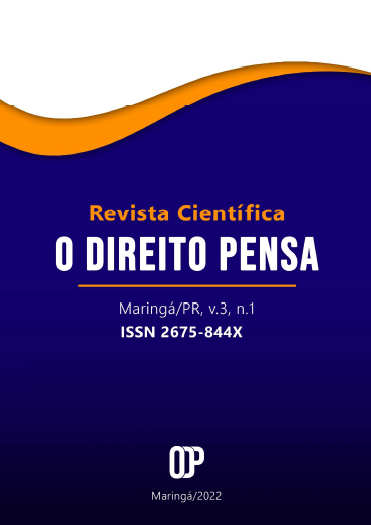POST-MODERNITY SYMPTOMS: LAW AND (AND) CRISIS?
Abstract
Although the postmodern crisis has been discussed for some time, be it in philosophy or sociology,
there are very few works that bring this theme closer to law, pointing out the symptoms that such a problem is
occurring and possible solutions to reality. Thus, there is a need to establish this line of reasoning in order to
understand which would be some of the indications that this postmodern crisis is affecting the Law, from an
approximation of praxis and theoretical references. This research is bibliographic and uses legal-reflective thinking
to address the crisis experienced by law in postmodernity. As a theoretical reference, the writings of Zygmunt
Bauman will be used, as well as, in particular, the reflection by Eduardo CB Bittar, which explains the relationship
between postmodernity and the crisis of Brazilian law, in addition to texts of journalistic/informative content,
which will be extremely important for a parallel to be made, bringing the post-modern crisis closer to the iuris
world. We will seek to explain what postmodernity is and what reflections it provides in the scope of Law, pointing
out some symptoms of a possible crisis in Law and specifically in Criminal Law. There is no intention of
exhausting the topic, which has exacerbated complexity, but to contribute to the deepening of the issue and the
search for possible solutions. It was concluded that the proposals of the Enlightenment were not reached and that
there is a deficiency in the Law in offering effective responses to the crisis brought to light by postmodernity.
Downloads
Este é um periódico de acesso aberto, o que significa que todo o conteúdo está disponível gratuitamente e sem custo para o usuário ou sua instituição. Os usuários estão autorizados a ler, baixar, copiar, distribuir, imprimir, pesquisar ou criar links para os textos completos dos artigos, ou usá-los para qualquer outro propósito legal, sem pedir permissão prévia do editor ou do autor. Isso está de acordo com a definição BOAI de acesso aberto.
Os(as) Autores(as) declaram que artigo é uma obra original e inédita, e sendo aprovado autorizo sua veiculação na Revista O Direito Pensa, reconhecendo que sua publicação implica automaticamente na cessão dos direitos autorais, para encaminhamentos pertinentes juntos a bases de dados de indexação de periódicos científicos.



